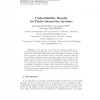Free Online Productivity Tools
i2Speak
i2Symbol
i2OCR
iTex2Img
iWeb2Print
iWeb2Shot
i2Type
iPdf2Split
iPdf2Merge
i2Bopomofo
i2Arabic
i2Style
i2Image
i2PDF
iLatex2Rtf
Sci2ools
139
click to vote
SYNASC
2008
IEEE
2008
IEEE
Undecidability Results for Finite Interactive Systems
Abstract. A new approach to the design of massively parallel and interactive programming languages has been recently proposed using rv-systems (interactive systems with registers and voices) and Agapia programming. In this paper we present a few theoretical results on FISs (finite interactive systems), the underlying mechanism used for specifying control and interaction in these systems. First, we give a proof for the undecidability of the emptiness problem for FISs, by reduction to the Post Correspondence Problem. Next, we use the construction in this proof to get other undecidability results, e.g., for the accessibility of a transition in a FIS, or for the finiteness of the language recognized by a FIS. Finally, we present a simple proof of the equivalence between FISs and tile systems, making explicit that they precisely capture recognizable two-dimensional languages.
Algorithms | Interactive Programming Languages | Interactive Systems | SYNASC 2008 | finite Interactive Systems |
Related Content
| Added | 01 Jun 2010 |
| Updated | 01 Jun 2010 |
| Type | Conference |
| Year | 2008 |
| Where | SYNASC |
| Authors | Alexandru Sofronia, Alexandru Popa, Gheorghe Stefanescu |
Comments (0)

